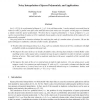Free Online Productivity Tools
i2Speak
i2Symbol
i2OCR
iTex2Img
iWeb2Print
iWeb2Shot
i2Type
iPdf2Split
iPdf2Merge
i2Bopomofo
i2Arabic
i2Style
i2Image
i2PDF
iLatex2Rtf
Sci2ools
145
click to vote
COCO
2011
Springer
2011
Springer
Noisy Interpolation of Sparse Polynomials, and Applications
Let f ∈ Fq[x] be a polynomial of degree d ≤ q/2. It is well-known that f can be uniquely recovered from its values at some 2d points even after some small fraction of the values are corrupted. In this paper we establish a similar result for sparse polynomials. We show that a k-sparse polynomial f ∈ Fq[x] of degree d ≤ q/2 can be recovered from its values at O(k) randomly chosen points, even if a small fraction of the values of f are adversarially corrupted. Our proof relies on an iterative technique for analyzing the rank of a random minor of a matrix. We use the same technique to establish a collection of other results. Specifically, • We show that restricting any linear [n, k, δn]q code to a randomly chosen set of O(k) coordinates with high probability yields an asymptotically good code. • We improve the state of the art in locally decodable codes, showing that similarly to Reed Muller codes matching vector codes require only a constant increase in query complexity in ...
Related Content
| Added | 18 Dec 2011 |
| Updated | 18 Dec 2011 |
| Type | Journal |
| Year | 2011 |
| Where | COCO |
| Authors | Shubhangi Saraf, Sergey Yekhanin |
Comments (0)

